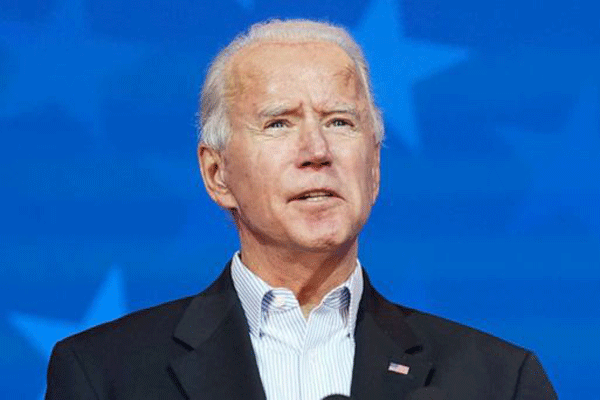
THE United States electioneering period ended on Wednesday when President Donald Trump left the White House and Joe Biden was sworn in as the 46th President of the country. However, Biden’s reign starts as calls for US$15 per hour minimum wage is growing and expectations are high among the working class for better salaries.
Biden’s success in the November 2020 elections was a result of coalition building of social movements, women rights groups and social democrats who threw their lot with the Democrats.
They were tired of Trump’s populist politics and the resurgence of ultra-rightists in the United States.
A few days before Biden’s swearing in ceremony, incoming Senate Budget Committee chair Bernie Sanders fired the warning shots about the expectations of the poor and working class who voted Democrats that they expected election promises to be fulfilled from day one in office.
“When Republicans controlled the Senate, they used the reconciliation process to provide huge tax breaks for the rich and large corporations. We’re going to use reconciliation to protect working families, the sick and the poor,” Sanders tweeted.
Biden has nowhere to hide, he has to deliver as Democrats control White House, Senate and the House of Representatives. He has to bite the bullet from his colleagues in the establishment and deliver or risk his party losing the mid-term elections in 2022.
The battle for better wages is global among the working class and Zimbabwe is no exception.
In the run-up to July 2018 elections, President Emmerson Mnangagwa ran on a platform of job creation, affordable healthcare and better education among other things. He sneaked into the presidency a small margin of 50,6% of the vote — just enough to avoid a runoff. However, his party enjoys a two-thirds majority in parliament.
- Chamisa under fire over US$120K donation
- Mavhunga puts DeMbare into Chibuku quarterfinals
- Pension funds bet on Cabora Bassa oilfields
- Councils defy govt fire tender directive
Keep Reading
In theory and practice, Mnangagwa can deliver on his promises if he so chooses or respects the electorate.
Both health and education are in shambles as the government battles the COVID-19 pandemic. It is becoming increasingly clear that these two issues — health and education — will not be prioritised in the short to medium term. To a large extent, these two services are now a preserve of the rich as Mnangagwa seeks a quick way out by privatising the sectors.
However, Mnangagwa’s greatest failure has been failure to create jobs.
In fact, many workers have lost their jobs during the COVID-19 pandemic which the administration is battling through hard lockdowns and curfews. The few that are still with jobs are mostly underpaid — their monthly paychecks cannot meet their basic monthly needs.
In the euphoria of celebrating the late former President Robert Mugabe’s ouster by the military, Zimbabweans failed to question the quality of jobs Mnangagwa was promising. Will the jobs pay a living wage? Will workers have a pension? Will there be job security? It seems the electorate was just eager to have a job and question these later.
Public health and education in 2020 and most likely 2021 will remain in the doldrums as civil servants are more often than not on strike or go-slow protesting over low wages and poor working conditions.
These same issues have pushed many health and education professionals to migrate in search of greener pastures leading to serious brain drain.
Can Zimbabwe have a statutory minimum wage that can make employees have dignity in working? It is possible, but it needs political will from the Executive.
For Zimbabwe under Mnangagwa, the prospect of a living wage looks remote considering his neoliberal approach of “Zimbabwe is open for business” that prays capital at the expense of workers’ welfare.
Labour economist Godfrey Kanyenze argues: “In Africa, job and income insecurity has continued largely unchecked and has resulted in the deterioration of the welfare and lives of the already suffering workers and their families.”
It is interesting that a template for fair remuneration has been developed since 1928 by the International Labour Organisation. These are Minimum Wage-Fixing Machinery Recommendation, 1928, the Minimum Wage Fixing Machinery (Agriculture) Recommendation, 1951, and the Equal Remuneration Recommendation, 1951.
These recommendations set out the criteria to be used in setting minimum wages as follows:
lthe needs of workers and their families (the PDL);
lthe general level of wages in the country;
lthe cost of living and changes therein;
l social security benefits.
This sound and pro-poor advice has fallen on deaf ears in pursuit of the elusive foreign direct investment dollars.
A dollar that seeks the greatest return on investment and more often than not invested in extractive economic sectors.
Very few invest in manufacturing or technological innovations and the seek foreign exchange deregulation and tax holidays.
Mnangagwa and his administration have a solid two-thirds majority to do as they please on minimum wages (living wage), access to affordable healthcare and education.
Their lack of interest in using their majority to legislate minimum wages across all sectors is because they enjoy jumping into bed with capital at the expense of their citizens.
Zimbabwe needs a serious debate on minimum wages, access to affordable healthcare and education, lest COVID-19 pandemic be used to normalise pauperisation of workers, denial of access to healthcare and education for the poor.











